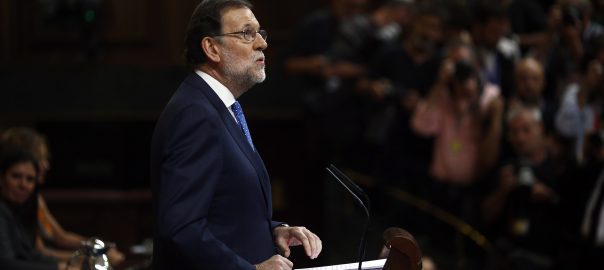30.08.2016 - 21:00
|
Actualització: 30.08.2016 - 23:00
The leader of the People’s Party (PP) stressed in Parliament that he represents the only ‘viable’ option to form a ‘stable’ government in Spain. ‘It is urgent for Spain to have a government as soon as possible, a government ready to act, to put an end to this democratic anomaly’, he said referring to the eight-month period of political deadlock in Madrid. The PP has the support of Ciutadans (C’s) and the Canary Islands nationalists, but their 170 seats fall short of the majority needed to form a government.
The main opposition party, the Spanish Socialist Party (PSOE) will vote ‘no’ in the confidence vote scheduled for Wednesday, and so will Podemos and pro-Catalan independence parties ERC and PDC. As things stand, the PP does not have enough support for Rajoy to pass the confidence vote this week and Spain will continue without a functioning government.
Rajoy faced Parliament on Tuesday, unlike in March, when he decided not to try to form government and socialist leader Pedro Sánchez took the lead. Rajoy said that he accepted the challenge this time because it’s a ‘more convenient and reasonable option’ than facing a third election in December. ‘My option is the only one that seems reasonable’, he said.
According to Rajoy, the PP could lead, with the support of C’s, a ‘moderate government’ that could boost the economy, ‘create jobs and generate confidence’. ‘There is no alternative. If there was an alternative, it would a government with a thousand different colours, radical and inefficient. That is not convenient for the Spanish people that do not desire it either. Such a government would be held hostage by parties whose aim is to defy the institutions and break the unity of Spain’, he pointed out, referring to a potential support by Catalan parties to a socialist-led government.
During his speech, Rajoy referred several times to the unity of Spain and to his opposition to Catalan independence. The interim Spanish president confirmed his rejection to any kind of referendum in Catalonia, something that is common ground with his allies from C’s but also with the PSOE. Rajoy said that his agreement with C’s includes a Pact for the Unity of Spain with a compromise to veto all referendums. ‘The only sovereign people is the Spanish people’, he stressed, highlighting what he sees as a ‘real threat against the territorial unity’ of Spain. ‘They want to end with our national sovereignty’, he added.
The spokesman of the PSOE in the Spanish Parliament, Antonio Hernando, described Rajoy’s speech as that of a ‘tired’ politician. ‘This is not the speech of a candidate with ambition towards the future and initiative to offer solutions to the Spanish people’, he said. According to Hernando, Rajoy is a ‘bureaucrat’ that only went to Parliament to ‘read a speech’ but doesn’t know ‘what 21st century Spain needs’. Hernando confirmed the socialists ‘no’ to Rajoy both on Wednesday and Friday votes.
Even PP’s allies, liberal C’s, regretted the ‘lack of enthusiasm’ in Rajoy’s speech. ‘There is a lack of faith, of will, of energy, of trust’, said the spokesman of C’s, Juan Carlos Girauta. The spokesman of Unidos Podemos, Iñigo Errejón, said that the speech had been ‘mediocre’ and accused the PP of ‘blackmailing’ Parliament by saying that there is no alternative to a conservative government. According to Errejón, Rajoy’s speech aggravated the territorial differences within Spain while offering no solutions.
The spokesman of liberal pro-Catalan independence PDC, Francesc Homs, described Mariano Rajoy as a ‘loser’ after his confidence speech. ‘He got on the defensive, he sees that he has lost the Catalan question’, he said, adding that Rajoy seemed ‘powerless and inept’ to lead a government. According to Homs, Catalonia will continue its path towards achieving an independent state and ‘no one will stop it’.
The confidence vote will be on Wednesday, with a second ballot on Friday if the first fails to produce a majority.


